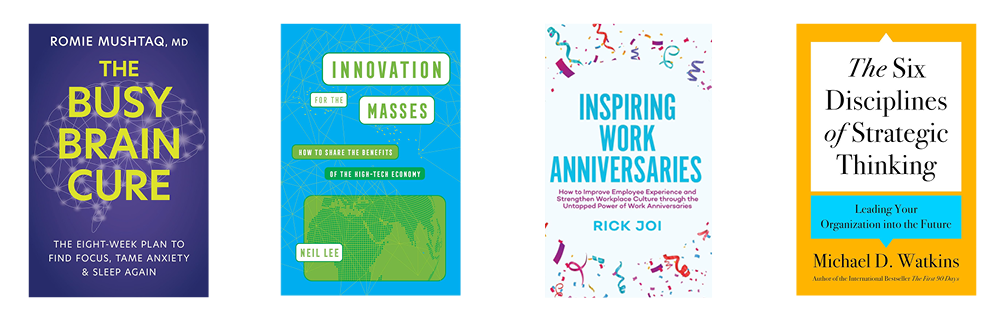January 9, 2024
January 09, 2024
Finding the right book at the right time can transform your life or your organization. We help you discover your next great read by showcasing four recently released titles each week.
The books are chosen by Porchlight's Managing Director, Sally Haldorson, and the marketing team: Dylan Schleicher, Gabbi Cisneros, and Jasmine Gonzalez. (Book descriptions are provided by the publisher unless otherwise noted.)
This week, our choices are:

Gabbi’s pick: The Busy Brain Cure: The Eight-Week Plan to Find Focus, Tame Anxiety, and Sleep Again by Romie Mushtaq, Hanover Square Press
Did you know:
- An estimated 40 million adults in the U.S. have anxiety
- 11 million people in the U.S. have adult-onset attention deficit disorder
- Insomnia and sleep disorders cost the US over 96 billion dollars annually
Traditional methods in neurology and psychiatry treat anxiety, ADD and insomnia as three separate diseases. The results are an addictive cycle that Dr. Romie Mushtaq defines as the “Busy Brain,” using stimulants like caffeine to stay focused and energized during the day, and then using sedatives like alcohol or sleeping pills at night.
Based on over 20 years of clinical research and experience, The Busy Brain Cure helps to break the addiction of the stimulant-sedative cycle and restore sleep, sanity and a sense of connection.
Dylan’s pick: Innovation for the Masses: How to Share the Benefits of the High-Tech Economy by Neil Lee, University of California Press
From San Francisco to Shanghai, many of the world's most innovative places are highly unequal, with the benefits going to a small few. Rather than simply asking how we can create more high-tech cities and nations, Innovation for the Masses focuses on what we can learn from places that foster innovation while also delivering the benefits more widely and equally. In this book, economist Neil Lee draws on case studies of Taiwan, Sweden, Austria, and Switzerland to set out how innovation can be successfully balanced toward equity.
As high-tech economies around the world suffer from polarized labor markets and political realities that lock in these problems, this book looks beyond the United States to other models of distributing a leading-edge economy. Lee emphasizes the active role of the state in creating frameworks to ensure that benefits are broadly shared, revealing that strong policies for innovation and mutual prosperity reinforce each other. Ultimately, Innovation for the Masses provides a vital window into alternative models that prioritize equity, the roadblocks these models present, and what other countries can learn from them going forward.
Jasmine’s pick: Inspiring Work Anniversaries: How to Improve Employee Experience and Strengthen Workplace Culture through the Untapped Power of Work Anniversaries by Rick Joi, Quintriple Publishing
Too many work anniversaries are missed or mediocre - and they're harming your organization more than you know
WHY IT MATTERS: For many organizations, workplace culture is now as important as strategy and execution-many would argue it's even more important, since it drives everything from employee productivity to customer retention. But where do you start, and how do you know if it's working?
There's a surprisingly simple answer, and it's work anniversaries. Because unlike other paths to improving workplace culture, work anniversaries are (1) visible, (2) measurable, and (3) easy to improve ... if you know how.
WHAT YOU'LL LEARN FROM THIS BOOK:
- What work anniversaries can achieve - the three scientifically-validated high-value outcomes that great work anniversaries deliver to organizations
- What gets in the way - the three forces of work anniversary mediocrity that undermine most work anniversary programs and how to avoid them
- Who can help and what they can do - concrete ideas for the nine different roles that contribute to great work anniversaries-it's not just managers and HR
THE BOTTOM LINE: If workplace culture matters to you, this book will show you how to take the most cost-effective and likely-to-succeed actions to shift your organization's work anniversaries from missed or mediocre to memorable and meaningful.
Sally’s pick: The Six Disciplines of Strategic Thinking: Leading Your Organization into the Future by Michael D. Watkins, Harper Business
International bestselling author of The First 90 Days Michael D. Watkins presents an actionable new framework to help aspiring leaders learn to think strategically—a set of skills more necessary than ever in a world of constant change.
Pattern recognition. Systems perspective. Mental agility. Structured problem-solving. Visioning. Political savvy. For every good leader who has mastered of one of these disciplines is a great leader who knows and has mastered all of them.
Michael D. Watkins, an expert on leadership transitions and organizational success, returns to the page with a new how-to guide for the modern leader. Here, he presents the six disciplines that separate the great from the good. Developed over the course of his storied career, Watkins’ approach to strategic thinking—"a set of mental disciplines leaders use to recognize potential threats and opportunities, establish priorities, and mobilize themselves and their organizations to envision and enact promising paths forward”—is the model followed by some of today’s most successful first-time CEOs and new business leaders.
The Six Disciplines of Strategic Thinking is a comprehensive and practical guide to strategic thinking, offering a wealth of insights and tools for leaders at all levels.
WHAT WE'VE BEEN READING AT HOME
 "The Wren, The Wren by Anne Enright. This is a generational novel that examines the awful behavior of one male poet toward his family, and how his daughter and granddaughter (also a poet) reconcile that behavior with his work, which is internationally celebrated. Beyond the big questions the author poses about art and society, Enright creates a really engaging family drama. She creates characters who don't like each other, who don't understand each other, but who still continue to orbit each other throughout life, even admiring one another for certain acts or traits. The book does not necessarily mean to say 'this is how it's done' or 'this is good or bad,' but it maybe at least helps scrape away the ideas of normalcy in family life, which might otherwise trouble us readers."
"The Wren, The Wren by Anne Enright. This is a generational novel that examines the awful behavior of one male poet toward his family, and how his daughter and granddaughter (also a poet) reconcile that behavior with his work, which is internationally celebrated. Beyond the big questions the author poses about art and society, Enright creates a really engaging family drama. She creates characters who don't like each other, who don't understand each other, but who still continue to orbit each other throughout life, even admiring one another for certain acts or traits. The book does not necessarily mean to say 'this is how it's done' or 'this is good or bad,' but it maybe at least helps scrape away the ideas of normalcy in family life, which might otherwise trouble us readers."
—Michael Jantz, Logistics Director






